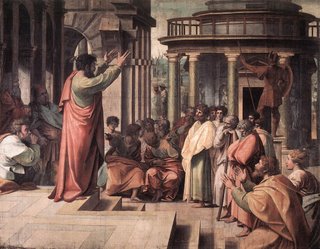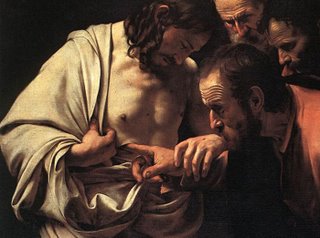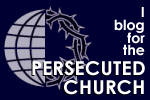Paul in Athens : Church History

Question: The Mediterranean world was a religiously pluralistic environment. Both Greek and Roman cultures had pantheons of many gods to be worshipped. Scripture records instances in which the Apostle Paul came into contact with these other religions. In Ephesus, the result of this encounter was a riot (see Acts 6) but in Athens, there was a very different result. We also live in an environment of religious pluralism. What might the Church today learn from Paul’s encounters that would help us as we encounter multiple religions?
Bibletruthonline.com answer:
The result of Paul's preaching in Athens gives us two important insights for the Church today. The first insight as told in Acts 17:22-23, is that Paul preached to an audience that on the whole had not heard about Jesus Christ. He began at a "neutral" point for them to relate to without personally attacking or openly denouncing them. He looked at the culture, the people, and their idol worship and stated: "Men of Athens, I perceive that in every way you are very religious. For as I passed along, and observed the objects of your worship, I found also an altar with this inscription, 'To an unknown god.' What therefore you worship as unknown, this I proclaim to you." (Acts 17:22-23). This allowed the audience to open their ears just a little because the initial proclamation was not directed at them in an insulting way. Who enjoys dealing with an insulting person?
The second insight that must be highlighted is the role of the Holy Spirit. The Spirit protected Paul. The Holy Spirit, in my opinion, was the source that gave Paul the insight on how to approach the people of Athens. Paul as like any man or woman, was probably fearful speaking to a people who worshiped so many idols, especially after the experience in Ephesus. Scripture tells us that "Now while Paul was waiting for them at Athens, his spirit was provoked within him as he saw that the city was full of idols" (Acts 17:16a). Isn't this true for us today? As Christ's sheep, are we not also "provoked" by the Spirit when we embrace an opportunity to share the Gospel message? What would be the purpose of the Spirit placing us in a situation of testifying to the Truth of Jesus Christ that we then use self-will and possibly skewed "logic" to figure out? I know that if the people of Athens gave Paul an ultimatum between renouncing Jesus Christ and living or refusing to deny Christ and dying...Paul would have died that day in Athens. This protection comes from our Shepherd through the means of the Holy Spirit and this is a crucial reflection to make on a daily basis.
Labels: Chruch History

















